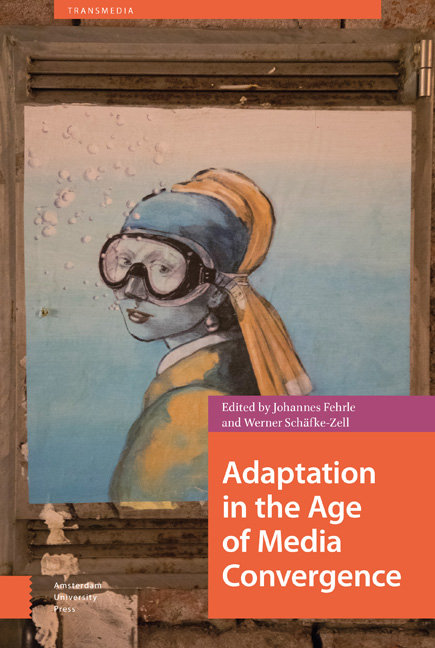Book contents
- Frontmatter
- Contents
- 1 Introduction: Adaptation in a Convergence Environment
- 2 Adaptation as Connection: A Network Theoretical Approach to Convergence, Participation, and Co-Production
- 3 Filing off the Serial Numbers: Fanfiction and its Adaptation to the Book Market
- 4 From Paratext to Polyprocess: The “Quirky” Mashup Novel
- 5 “You Just Got Covered”: YouTube Cover Song Videos as Examples of Para-Adaptation
- 6 Masters of the Universe? Viewers, the Media, and Sherlock's Lead Writers
- 7 Alien Adapted (Again and Again): Fictional Universes between Difference and Repetition
- 8 “Everything is Awesome:” Spreadability and The LEGO Movie
- 9 Localization as Adaptation in the Wolfenstein Franchise
- Index
1 - Introduction: Adaptation in a Convergence Environment
Published online by Cambridge University Press: 21 November 2020
- Frontmatter
- Contents
- 1 Introduction: Adaptation in a Convergence Environment
- 2 Adaptation as Connection: A Network Theoretical Approach to Convergence, Participation, and Co-Production
- 3 Filing off the Serial Numbers: Fanfiction and its Adaptation to the Book Market
- 4 From Paratext to Polyprocess: The “Quirky” Mashup Novel
- 5 “You Just Got Covered”: YouTube Cover Song Videos as Examples of Para-Adaptation
- 6 Masters of the Universe? Viewers, the Media, and Sherlock's Lead Writers
- 7 Alien Adapted (Again and Again): Fictional Universes between Difference and Repetition
- 8 “Everything is Awesome:” Spreadability and The LEGO Movie
- 9 Localization as Adaptation in the Wolfenstein Franchise
- Index
Summary
An increased interest in adaptation studies in the early 21st century has generated countless discussions about rethinking adaptations as well as the field of adaptation studies as a whole. The impression has often been voiced, for instance by Thomas Leitch in his essay for the inaugural issue of the journal Adaptation, that adaptation studies is “at a crossroads,” in which its methodology and material are in transition from the discipline’s humble novel-to-film-studies beginnings to a broader, if somewhat unclear, future. As part of a moment in the field's history, in which scholars repeatedly state ambitious research agendas, Linda Hutcheon has likewise described adaptation studies as moving “well beyond [its] familiar film/ performance focus” and on to readings that highlight the politics of our time, the “indigenization” of adaptations, and approaches that question notions of priority and anteriority in unprecedented ways.
There is, however, another major change – the elephant in the room of adaptation studies, so to speak: since adaptation, at least in its most common understanding, describes the transposition of a story or its elements from one medium to another, it is necessarily bound to questions of mediality and remediation. Therefore, one of the most important new developments in adaptation studies is constituted by the shift in the global mediascape in light of the rise of digital media since the 1980s and the spread of the internet since the 1990s. This transformation amounts to nothing less than a shift from a largely analog, localized, image- and text-based “Gutenberg Galaxy” to a more rapidly disseminating mixed analog-digital environment. It is a moment that forces us, once again, to re-examine notions of authorship, control, audiences, sources and adaptations, as well as interactions between medium and consumer, or between consumers and producers. This volume sets out to explore how these shifts relate to adaptation studies and what they mean for the field. It does so by examining new forms of adaptations and their cultural embeddedness both theoretically and analytically, with the help of a range of texts constituting some of the major new forms of adaptations and adaptation environments that have arisen in the wake of the rise of digital media.
- Type
- Chapter
- Information
- Adaptation in the Age of Media Convergence , pp. 7 - 30Publisher: Amsterdam University PressPrint publication year: 2019
- 1
- Cited by



